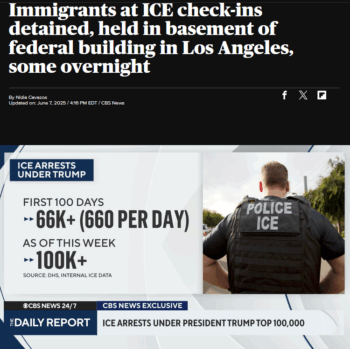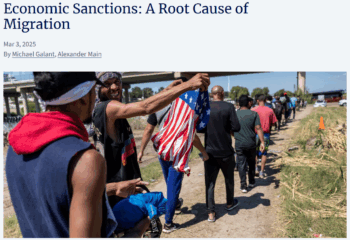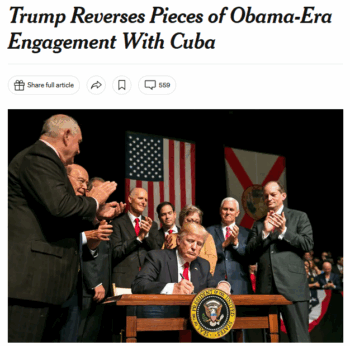Janine Jackson interviewed CEPR’s Michael Galant about sanctions and immigration for the June 20, 2025, episode of CounterSpin. This is a lightly edited transcript.

CBS (6/7/25)
Janine Jackson: Federal agents are abducting people off the streets, rolling up on workplaces and playgrounds to tear men, women and children away from their families. Driving off in vans, telling no one where they’re going. They’re interrupting scheduled immigration status appointments to say, We’ve changed the rules, and now you’re out of status and a criminal. Into the van. Raising a question, observing—well, that counts as interference, also now a crime. Sometimes they’re saying that the abduction was an administrative error, after someone has been left in a basement without food or water for a while.
There is much to acknowledge and understand in the current nightmare, but if one question is, “Given it all, why would anyone think it makes sense to try to come to the US to live?” then you’ll need to expand your vision to the global stage, and see the role that US actions have in determining conditions in the countries immigrants are coming from. And why “If you don’t like it here, go back where you came from,” lands different when circumstances in the place they come from will still be determined by US policy.
Michael Galant is senior research and outreach associate at the Center for Economic and Policy Research. He joins us now by phone from here in town. Welcome to CounterSpin, Michael Galant.
Michael Galant: Thanks so much for having me.
JJ: I will say the issue isn’t only with MAGA replacement theory zealots who think that the immigrants are dragging us into criminal chaos. I suspect a lot of “liberals” think that while it’s mean to call immigrants “invaders”—because, after all, “they” do a lot for “us”—still, they’re coming here to take advantage of our superior quality of life, and maybe we just can’t afford that anymore. The “us and them” line is still operative in many people’s understanding of immigration, and that confuses and obscures something, doesn’t it?
MG: Yeah, and I think you’re absolutely right that there is this sort of bipartisan consensus that, whatever we might disagree on what the appropriate level of migration is, or with what humanity we should be treating migrants, but they’re still operating on the same terrain, right, the same sort of frame of understanding, of the question of migration. And I think that question itself really needs to be addressed, as you mentioned in the intro, it is often US policies that are themselves determining the conditions that caused migrants to leave in the first place. And it’s oddly rarely questioned in Congress. It’s rarely discussed, why are people leaving in the first place, and, perhaps, why is the US enacting policies that are contributing to those conditions?

CEPR (3/3/25)
JJ: The US interferes in other countries in multiple ways, but you wrote recently about one that goes under the radar—under under the radar, in this context. So talk to us about this piece that you wrote with Alex Main about economic sanctions. And I want to say, you make clear it’s not about a feeling, it’s not about an anecdotal sense about the reasons people have for moving. It’s research, it’s data.
MG: Yeah, that’s exactly right. And I want to make clear from the start: Migrants should be welcomed into our communities. They should not be scapegoated, they should not be repressed. And, at the same time, we should not be creating the conditions that force them to leave their homes.
I mean, most migrants are not choosing to leave their community, to leave the only place they’ve ever known, often leave their families, to come to a new country where they risk discrimination, on a whim, right? They’re coming for good reason, and that is typically they’ve seen either violence and insecurity in their homes, or they are facing poverty and lack of economic opportunity.
That should not be a shocking thing. I think if you talk to anybody on the street, they will tell you that migrants are more likely to be coming from poorer countries to wealthier countries. And there’s US involvement in that, and the whole range of potential issues, of which economic sanctions is only one. But I can go into that, as that was the subject of our piece and of our research.
JJ: Please.

CEPR (9/25/23)
MG: So, effectively, the argument here is pretty simple. There are mounds of evidence that economic sanctions harm people. Sanctions come in many forms, but in their broadest forms, broad economic sanctions, which is those imposed on Cuba and Venezuela, the goal, the intent, is to harm the macroeconomy of these countries, which in turn, of course, affects civilians. It affects their lives, it affects whether they can feed their children. So because there are mountains of evidence that sanctions are harming individuals, there are also mountains of evidence that people migrate due to economic need. One plus one equals two. It is clear that when we impose sanctions on countries and hurt their people, the effect of that is going to be that people migrate to the United States.
But there is also recent research to that effect. So in October of last year, the Journal of Economic Behavior and Organization published what I think is the first and only systematic cross-national analysis of how sanctions impact international migration. And using data flows from 157 countries, I believe, the authors find that Western multilateral sanctions have increased, on average, immigration from targeted countries by 22 to 24%. So that’s a massive increase as a result of sanctions. And the authors also find that when sanctions are lifted, migration decreases again. So there’s a clear empirical analysis there that one plus one equals two, sanctions harm people, harmed people migrate, sanctions cause migration.
JJ: I think that there is such a miscommunication about economic sanctions in the news media that obscures that very kind of information. They’re often presented as “making Castro squirm,” they’re presented as targeted, and they’re really only going to target leadership in countries. Now there’s a problem with that already, but what you’re saying is, no, there’s no way to simply surgically target an economic sector of a country without having that impact folks, and usually the most vulnerable first.

Michael Galant: “Sanctions are presented as this peaceful alternative to warfare, but often for civilians on the ground, the effects are very similar to war.”
MG: That’s exactly right. Sanctions are presented as this peaceful alternative to warfare, but often for civilians on the ground, the effects are very similar to war.
And “sanction” is a broad term. This does include imposing visa restrictions on individual foreign leaders. Of course, that’s not going to have the same effect as, say, the entire embargo of Cuba. But many of our sanctions regimes are broad, and intentionally so. The implicit logic of them is we hurt this country’s economy, that causes distress among the civilian population, and eventually the civilian population will rise up and overthrow their government.
And so in Cuba, when the embargo was imposed, there was a State Department memo from the time that has since been declassified, where it makes those intentions very plain. It says the goal is to cause hunger in order to overthrow the regime.
These days, government officials, advocates of sanctions, are often much more careful in their word choices. But the implicit logic of sanctions involves the intentional targeting of civilians.
JJ: I think it’s important to interrogate that logic. Some would say it’s hypocritical or cross-purposed to say, “Well, we’re going to sanction their country into hardship…but they can’t come here!” It’s complicated, and yet it makes sense if you’re of a certain frame of mind, I guess.
MG: That’s exactly right. To take one example, and I can also talk through Venezuela, but to take Cuba as an example, because it is one of our oldest, most comprehensive sanctions regimes, sanctions have been in place over six decades now, with the embargo. And there has been some tightening and loosening of sanctions over the years, particularly under the Obama administration. There was a light thawing of relations and the easing of sanctions, and we saw their economy really improved during that time, as hopes improved and the like.

New York Times (6/16/17)
But then when Trump came in the first time, he reversed all the Obama measures, and then tightened sanctions even further. Biden, unfortunately, basically maintained the Trump measures. He made only very small tweaks at the margin. And as a result of that, we’ve seen, from 2020 to 2024, 13% of Cuba’s population emigrated in those four years, 13%. It’s really shocking to imagine, if any of your listeners—many are probably based in the US, some are probably based abroad—imagine 13% of your country’s population immigrating over four years, and a good deal of that immigration is a result of the US sanction that has ended in an economic crisis, and made it much harder for ordinary people to live their lives.
JJ: Media tend to personalize, just to pull us back to media. Here’s a woman who crossed the border, holding her son close, or whatever, and it can be moving and poignant, but I feel that one effect of that is to kind of get people thinking on an individual level: “Well, I would never do that. I wouldn’t make that choice in those circumstances.” In terms of media, the story of migration is of course about people, but if we don’t integrate an understanding of policy and practices, we’re not going to get that story right.
MG: Absolutely. I think we need both. I understand that my organization has a lot of economists, and we’ll talk in terms of numbers, and sometimes that won’t really pull at people’s heartstrings in the way that they need to. And at the same time, on the other hand, you have the case where you talk only in terms of individuals, and don’t understand the broader structural causes, and how US policy contributes to these conditions. So we need both of them. Absolutely. But, yeah, we should not ignore, we should not remove ourselves from the structural causes, because, ultimately, when you look at the world—no one would disagree with you that migration tends to flow from poorer countries to wealthier countries.
And so the “solution” to migration—not that migration is itself a problem—but the “solution” is very clear. It is development of the Global South, allowing the Global South to develop, addressing the many ways in which US and other policies of wealthy countries inhibit the stability, economic and otherwise, of the Global South, and to allow greater shared global peace and stability and prosperity.
JJ: Well, and finally and briefly, that vision is shared. You note in the piece that, while the Biden administration claimed to address root causes, they had an inadequate understanding or representation of those causes, if you will. But there are, finally, other visions out there that acknowledge this.
MG: That’s right. And we’re seeing, of course, there have always been more grassroots people’s movements that have mobilized in solidarity with the Global South in pursuit of a more equitable world order. But now we’re also seeing in Congress, there was a group of progressives led by Rep. Greg Casar of Texas, and also representatives Ramirez and Kamlager-Dove, who created a new caucus, but it’s specifically about reframing how we understand migration.
And Representative Casar introduced a migration stability resolution, which is all about the actions that would be needed to address how the US contributes to migration. And it includes, just to name a few, how US weapons trafficking feeds cartel violence in Mexico; fixing trade agreements that are designed to work for multinational corporations based in the US, instead of working-class people here and abroad; fixing the inequities in the global financial architecture that result in debt crises in developing countries; addressing the climate crisis; stopping destabilizing US interventions, from coups to military interventions.
This whole gamut of actions is to truly address migration at its root, if we’re not just listening to those who are trying to scapegoat migrants. To truly address migration at its core requires an entire reorientation of how the US relates to the Global South, and Latin America in particular.
JJ: We’ve been speaking with Michael Galant, from the Center for Economic and Policy Research. His piece, with Alex Main, “Economic Sanctions: A Root Cause of Migration,” can be found on their website at CEPR.net. Thank you so much, Michael Galant, for joining us this week on CounterSpin.
MG: Thank you.
This content originally appeared on FAIR and was authored by Janine Jackson.